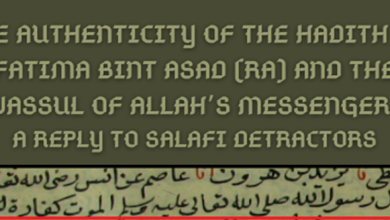Authenticity of a du’a at iftar time
Is the following du’a (supplication) said at the breaking of the fast (iftar) weak (da’eef) or not and can one act upon it?
اللَهُمَّ لك صُمْتُ، وعلى رِزْقِكَ أفْطَرْتُ
Answer:
The authenticity of the iftar du’a as in Sunan Abi Dawud and elsewhere may be determined as follows:
Sanad (chain of transmission) and text (matn) as in Sunan Abi Dawud (no. 2351)
حدَّثنا مُسَدَّدٌ، حدَّثنا هُشَيْمٌ، عن حُصينٍ
عن معاذ بن زُهْرة، أنه بلغه أن النبيَّ -صلَّى الله عليه وسلم- كان إذا أفطر، قال: “اللَهُمَّ لك صُمْتُ، وعلى رِزْقِكَ أفْطَرْتُ”
Translation:
Book 13, Number 2351:
Narrated Mu’adh ibn Zuhra: The Prophet of Allah (peace and blessings be upon him) used to say when he broke his fast: ‘O Allah, for Thee I have fasted, and with Thy provision I have broken my fast.’
Those who have weakened the above narration have done so for two main reasons:
- The narrator known as Mu’adh ibn Zuhra (also known as Mu’adh Abu Zuhra al-Dabbi) was a tabi’i (a disciple of at least one Prophetic Sahabi), and the only explicit tawthiq (accreditation) on him was recorded by Ibn Hibban (d. 354 AH) in his Kitab al-Thiqat (Book of trustworthy narrators):
11056 – معَاذ أَبُو زهرَة الضَّبِّيّ يروي الْمَرَاسِيل روى عَنهُ حُصَيْن بن عبد الرَّحْمَن
2. The narration is mursal (a narration missing the link whereby the name of the Sahabi was dropped) as Mu’adh was a tabi’i and not a Sahabi, and thus he did not directly narrate from the Prophet (sallallahu alaihi wa sallam). To some Muhaddithin the mursal is a type of weak narration, but to other Imams like Abu Hanifa (d. 150 AH) and Malik ibn Anas (d. 179 AH) they are acceptable with some conditions.
Al-Hafiz ibn Hajar al-Asqalani (d. 852 AH) has graded Mu’adh to be maqbul (acceptable) in his Taqrib al-Tahdhib as follows:
6731- معاذ ابن زهرة ويقال [معاذ] أبو زهرة مقبول من الثالثة أرسل حديثنا فوهم من ذكره في الصحابة د
The grading of maqbul (acceptable) means that the narrator is acceptable if supported by a follow up. The fact of the matter is that al-Hafiz ibn Hajar has also authenticated some narrations which have the technically maqbul narrators as per his own grading system (as demonstrated in a forthcoming work) without further supporting follow ups. Hence, the above sanad (chain of transmission) cannot be weakened on the premise that Mu’adh was graded as maqbul by ibn Hajar.
Some scholars may also have an issue with accepting the lone tawthiq (accreditation) of Ibn Hibban on Mu’adh, but nevertheless, some prominent Muhaddithin (hadith scholars) have declared the overall sanad (chain of transmission) to be Hasan (good) as will be demonstrated below.
Some scholars were under the impression that Mu’adh ibn Zuhra was a Sahabi as al-Hafiz Ibn Hajar mentioned in his work listing the names of the Sahaba, known as al-Isaba fi tamyiz al-Sahaba (6/285) as follows:
8601- معاذ بن زهرة
: ذكره يحيى بن يونس الشيرازيّ في الصحابة، وهو تابعيّ أرسل حديثا أخرجه أبو داود في المراسيل.
وقال جعفر المستغفريّ: وهم من زعم أن له صحبة. وقال البخاريّ، عن يحيى بن معين: حديثه مرسل. وقد ذكره البغوي في الصحابة، ولكنه قال: لا أدري له صحبة أم لا؟.
Ibn Hajar mentioned that Yahya ibn Yunus al-Shirazi listed Mu’adh as a Sahabi, though he is actually a Tabi’i, as pointed out by others. Ibn Hajar pointed out this error of calling him a Sahabi in the above quote from his Taqrib (no. 6731).
Since some thought he was a Sahabi, this would indicate that Mu’adh was a more senior ranking Tabi’i, and thus his mursal narrations are acceptable to some Imams. Ibn Hajar mentioned the narration at hand in his Nata’ij al-afkar fi takhrij ahadith al-Adhkar (5/187, Dar Ibn Kathir edn) as follows:
وروينا في سنن أبي داود، عن معاذ بن زهرة أنه بلغه، أن النبي صلى الله عليه وسلم كان إذا أفطر قال: ((اللهم لك صمت وعلى رزقك أفطرت)) هكذا رواه مرسلاً
Ibn Hajar mentioned the narration from Sunan Abi Dawud and mentioned that it was a mursal narration from Mu’adh ibn Zuhra and remained silent on the overall authenticity. Indeed, the Hanafi Muhaddith known as Mulla Ali al-Qari (d. 1014 AH) mentioned the following from his teacher Imam Ibn Hajar (al-Haytami al-Makki, d. 974 AH) in his Mirqat al-Mafatih (4/1387, no. 1994) on the status of the narration from Mu’adh as in Sunan Abi Dawud:
قَالَ ابْنُ حَجَرٍ: وَهُوَ مَعَ إِرْسَالِهِ حُجَّةٌ فِي مِثْلِ ذَلِكَ
Meaning: “Ibn Hajar said: And he (Mu’adh) is with his transmission of the mursal a proof (hujja) in such a matter.”
This indicates that the mursal of Mu’adh ibn Zuhra is acceptable as evidence for such matters connected to virtuous actions (Fada’il al a’mal) like the recitation of supplications.
Note that Imam al-Dhahabi (d. 748 AH) remained silent on the overall status of Mu’adh in his Al-Kashif fi Ma’rifa Man Lahu Riwaya fi al-Kutub al-Sitta:
5501- معاذ بن زهرة الضبي أبو زهرة تابعي أرسل وعنه حصين بن عبد الرحمن د
Imam al-Bukhari (d. 256 AH) has listed Mu’adh in his al-Tarikh al-Kabir (7/364) and mentioned no Jarh (disparagement) or Ta’dil (explicit praise) on him as follows:
1568 – مُعَاذ أَبُو زهرة قَالَ حصين، مرسل، قاله يحيى بن معين.
It is worth taking note of this rule:
Imam al-Mizzi (d. 742 AH) mentioned the following in his Tahdhib al-Kamal (18/265, Awwad edn) from al-Hafiz Abu Muhammad Abdullah ibn Ahmed ibn Sa’eed ibn Yarbu al-Ishbili (b. 444 AH – d. 522 AH) who quoted from the Tarikh of al-Bukhari that he had in his possession:
قال الحافظ أبو محمد عبدالله بن أحمد بن سعيد بن يربوع الاشبيلي: بين مسلم جرحه في صدر كتابه، وأما البخاري، فلم ينبه من أمره على شئ فدل أنه عنده على الاحتمال، لانه قد قال في ” التاريخ “: كل من لم أبين فيه جرحة فهو على الاحتمال، وإذا قلت: فيه نظر، فلا يحتمل
Imam al-Bukhari said:
“For everyone against whom I do not mention clear words of disparagement, there remains some possibility of his being acceptable, but if I say, ‘There is doubt about him’, then there remains no possibility.”
Hence, Mu’adh may be deemed to have been an acceptable type of narrator to al-Bukhari.
Scholars of hadith who declared the sanad or text to be Hasan (good):
- Al-Hafiz Ibn al-Mulaqqin (d. 804 AH ) declared the sanad (chain of transmission) to be Hasan (good) though he knew it was also mursal in his al-Badr al-Munir (5/710, Dar al-Hijra edn) as follows:
الحَدِيث الثَّانِي بعد الْأَرْبَعين
عَن معَاذ : ” كَانَ رَسُول الله صَلَّى اللَّهُ عَلَيْهِ وَسَلَّم َ إِذا أفطر قَالَ : اللَّهُمَّ لَك صمت
وَعَلَى رزقك أفطرت “.
هَذَا الحَدِيث رَوَاهُ أَبُو دَاوُد فِي «سنَنه» بِهَذَا اللَّفْظ عَن مُسَدّد ، نَا
هشيم ، عَن حُصَيْن ، عَن معَاذ بن زهرَة أَنه بلغه ” أَن النَّبِي صَلَّى اللَّهُ عَلَيْهِ وَسَلَّم َ كَانَ إِذا
أفطر قَالَ … ” (فَذكره) وَهَذَا إِسْنَاد حسن لكنه مُرْسل ؛ معَاذ بن زهرَة لم
يدْرك النَّبِي صَلَّى اللَّهُ عَلَيْهِ وَسَلَّم
Note, Ibn al-Mulaqqin was the Shaykh of Ibn Hajar al-Asqalani in Hadith.
2. Al-Hafiz ibn Hajar al-Asqalani (d. 852 AH) has recorded the hadith from Sunan Abi Dawud in his Hidayatul Ruwa ila takhrij ahadith al-Masabih wa’l Mishkat (2/323, no. 1935). He has mentioned a rule in the introduction to this same work (1/58) that any narration placed in the second category under each chapter heading would be deemed to be a Hasan (good) narration if he remained silent on it. Since al-Hafiz ibn Hajar placed the narration in question in the second category and remained silent on it then this indicates that the narration was Hasan (good) to Ibn Hajar himself.
3. Imam Jalaluddin al-Mahalli (d. 864 AH) declared the sanad (chain of transmission) to be Hasan (good) though he knew it was also mursal in his Sharh al-Mahalli ala’l Minhaj al-Nawawi (1/125) as follows:
(وَأَنْ يَقُولَ عِنْدَ فِطْرِهِ {اللَّهُمَّ لَك صُمْت وَعَلَى رِزْقِك أَفْطَرْت}) رَوَى أَبُو دَاوُد عَنْ مُعَاذِ بْنِ زُهْرَةَ أَنَّهُ صَلَّى اللَّهُ عَلَيْهِ وَسَلَّمَ كَانَ إذَا أَفْطَرَ قَالَ ذَلِكَ وَإِسْنَادُهُ حَسَنٌ لَكِنَّهُ مُرْسَلٌ
4. Shaykhul-Islam Zakariyya al-Ansari (d. 926 AH) declared its isnad (chain of transmission) to be Hasan despite also knowing it is mursal in his Asna al-Matalib (1/422) as follows:
(وَ) يَنْبَغِي لَهُ (أَنْ يَقُولَ بَعْدَ) وَفِي نُسْخَةٍ عِنْدَ (الْإِفْطَارِ اللَّهُمَّ لَكَ صُمْت وَعَلَى رِزْقِك أَفْطَرْت) لِلِاتِّبَاعِ رَوَاهُ أَبُو دَاوُد بِإِسْنَادٍ حَسَنٍ لَكِنَّهُ مُرْسَلٌ
5. Imam Shamsud-Din al-Ramli (d. 1004 AH) ) also declared its isnad (chain of transmission) to be Hasan despite also knowing it is mursal in his Nihayatul Muhtaj ila Sharh al-Minhaj (3/183) as follows:
(وَأَنْ يَقُولَ عِنْدَ) أَيْ عَقِبَ (فِطْرِهِ: «اللَّهُمَّ لَك صُمْت وَعَلَى رِزْقِك أَفْطَرْت» ) لِلِاتِّبَاعِ رَوَاهُ أَبُو دَاوُد بِإِسْنَادٍ حَسَنٍ لَكِنَّهُ مُرْسَلٌ
6. Shaykh Sulayman ibn Umar al-Ujayli al-Azhari (d. 1204 AH) also declared its isnad (chain of transmission) to be Hasan despite also knowing it is mursal in his Futuhat al-Wahhab bi-Tawdih Sharh Minhaj al-Tullab (2/330) as follows:
هُوَ أَوْلَى مِنْ قَوْلِهِ «عِنْدَ فِطْرِهِ اللَّهُمَّ لَك صُمْت وَعَلَى رِزْقِك أَفْطَرْت لِأَنَّهُ – صَلَّى اللَّهُ عَلَيْهِ وَسَلَّمَ – كَانَ يَقُولُ ذَلِكَ» رَوَاهُ أَبُو دَاوُد بِإِسْنَادٍ حَسَنٍ لَكِنَّهُ مُرْسَلٌ.
7. Imam Sulayman ibn Muhammad al-Bujayrami (d. 1221 AH) also declared its isnad (chain of transmission) to be Hasan despite also knowing it is mursal in his Hashiya al-Bujayrami ala Sharh al-Minhaj (2/79) as follows:
هُوَ أَوْلَى مِنْ قَوْلِهِ عِنْدَ فِطْرِهِ «اللَّهُمَّ لَك صُمْت وَعَلَى رِزْقِك أَفْطَرْت» لِأَنَّهُ – صَلَّى اللَّهُ عَلَيْهِ وَسَلَّمَ – كَانَ يَقُولُ ذَلِكَ رَوَاهُ أَبُو دَاوُد بِإِسْنَادٍ حَسَنٍ لَكِنَّهُ مُرْسَلٌ
8. Shaykh al-Hasan ibn Ahmed al-Ruba’ie al-San’ani (d. 1276 AH) also declared its isnad to be Hasan despite also knowing it is mursal in his Fath al-Ghaffar al-Jami li-Ahkam Sunna Nabiyyina al-Mukhtar (2/889) as follows:
2751 – وعن معاذ بن زُهْرَة بلغه «أن رسول الله – صلى الله عليه وسلم – كان إذا أفطر قال: اللهم لك صمت وعلى رزقك أفطرت» رواه أبو داود مرسلًا بإسناد حسن
9. Shaykh Muhammad Awwama has declared the sanad to be Hasan despite knowing it to be also mursal in his editing of the Musannaf Ibn Abi Shayba (6/329, no. 9837). Shaykh Awwama also mentioned the supporting narrations (shawahid) for this narration despite them containing weakness also with chains going back to the Sahaba like Ibn Abbas (as recorded by al-Tabarani in his Mu’jam al Kabir [no. 12720] and al-Daraqutni in his Sunan [no. 2280]), Anas ibn Malik (as recorded by al-Tabarani in his Mu’jam al Awsat [no. 7545] and in his Mu’jam al-Saghir [no. 912]) and Ali ibn Abi Talib (as recorded by al-Harith ibn Abi Usama [see the Zawa’id version of his Musnad by al-Haythami known as Bughyatul Ba’hith an Zawa’id Musnad al-Harith, no. 469], radiallahu anhum ajma’in.
The late Albanian Salafi scholar known as Abdul Qadir al-Arna’ut (d. 2004) has also said that the narration of Mu’adh has witnessing narrations (shawahid) that strengthen it in his editing of Jami al-Usul (6/378, no. 4560, fn. 1) of Imam Ibn al-Athir al-Jazari (d. 606 AH).
Imam al-Nawawi (d. 676 AH) said that it is mustahab (praiseworthy) to say the actual du’a at hand in his al-Majmu Sharh al-Muhadhhab (6/362), as follows:
والمستحب أن يقول عِنْدَ إفْطَارِهِ اللَّهُمَّ لَكَ صُمْتُ وَعَلَى رِزْقِكَ أفطرت لما روى أبو هُرَيْرَةَ قَالَ ” كَانَ رَسُولُ اللَّهِ صَلَّى اللَّهُ عَلَيْهِ وسلم إذا صام ثم أفطر قال اللهم لك صمت وعلي رزقك أفطرت
Note, that al-Nawawi has mentioned that it was reported by the Sahabi known as Abu Hurayra (ra), but this seems to be a scribal error as it should be from Mu’adh Abu Zuhra, who is also known as Mu’adh ibn Zuhra.
In conclusion, the narration cannot be deemed weak by unanimous declaration of all prominent Muhaddithin (hadith scholars), and such a mursal narration is acceptable as proof to a group of scholars like those named earlier, and the sanad (chain of transmission) may be considered to be Hasan (good) and thus amal (action) may be made on this narration, alongside other authentic narrations on the subject matter of the supplications to be made at the breaking of the fast, bi-idhnillahi ta’ala.
Wallahu a’lam
Abul Hasan Hussain Ahmed
Darultahqiq.com
23rd Ramadan 1437AH/June 28th 2016





